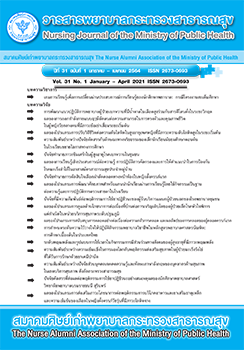Effects of Continuous Labor Support Programme on Fear of Childbirth and Childbirth Outcomes among Primiparous Women
Main Article Content
Abstract
Labor support is an important independent role of the midwives. This quasi- experimental research aimed to study the effects of continuous labor support on fear of childbirth and outcomes of labor among primiparous women. Participants were 48 primiparous pregnant women who attended at antenatal clinic and gave birth at 38-40 weeks of gestational age in the delivery room at Srisaket hospital. The sample was selected by inclusion criteria and simple a random sampling technique and equally divided into the experiment group and the control group. Each group consisted of 24 pregnant women. Data were collected using a personal and demographic questionnaire, pregnancy and labor records, and the fear of birth scale. Data were analyzed by descriptive statistics, Chi-square tests, and independent t-tests. The results found that the experimental group had significantly decreased average score of fear of childbirth during pregnancy period compared to that of the control group (t=2.447, p=.009). The participants in the experimental group also had a significantly lesser the proportion of oxytocin used than those in the control group ( X2=11.11, df=1, p=<.001) These findings suggest that the nurse-midwives in labor rooms should provide childbirth preparation and give continuous labor support for parturient, especially the first-time mothers, to decrease fear and oxytocin administration.
Article Details
บทความและรายงานวิจัยในวารสารพยาบาลกระทรวงสาธารณสุข เป็นความคิดเห็นของ ผู้เขียน มิใช่ของคณะผู้จัดทำ และมิใช่ความรับผิดชอบของสมาคมศิษย์เก่าพยาบาลกระทรวงสาธารณสุข ซึ่งสามารถนำไปอ้างอิงได้
References
2. Sansiriphun N. Fear of childbirth. Nursing Journal 2013;40:103-12. (in Thai)
3. Nilsson C, Lundgem I, Karlstrom A, Hildingsoon I. Self-reported fear of childbirth and its association with women’s birth experience and mode of delivery: A longitudinal population-based study. Women and Birth 2011;25(3):114-21. doi:10.1016/j.wombi.2011.06.001
4. Perry SE, Lowdermilk DL, Cashion K, Alden KR. Maternity and newborn nursing: clinical companion. (2nd ed). St. Louis: Elsevier Mosby. 2012.
5. Pillitteri A. Maternal and child health nursing: care of the childbearing & childbearing family (6thed.). Philadelphia: Lippincott Williams & Wilkins.2010.
6. Maneein M. Comparative study of postpartum quality of life between patients having normal vaginal delivery and cesarean section. Journal of Health Science 2015;24(4):648-58. (in Thai)
7. Soontornlimsiri B, Phumonsakul S, Chareonpol O. The effect of nursing support during labor on laboring stress and perception of childbirth experience of first-time teenage mothers. Ramathibodi Nursing Journal 2009;15(3):361-72. (in Thai)
8. Adams ED, Bianchi AL. A practical approach to labor support. Journal of Obstetric, Gynecologic, & Neonatal Nursing 2008;37(1):106-15. doi:10.1111/j.1552-6909.2007.00213.x.
9. Leap N, Sandall J, Buckland S, Huber U. Women’s experiences of pain in labour and relational continuity of care. Journal of Midwifery & Womens Health 2010;55(3):234-42.
10. Simkin P, O’Hara, M. Nonpharmacologic relief of pain during labor: systematic reviews of five methods. American Journal of Obstetrics and Gynecology 2002;186:131-59.doi:10.1016/S0002-9378(02)70188-9.
11. Akbarzadeh M, Masoudi Z, Zare N, Kasraeian M. Comparison of the effects of maternal supportive care and acupressure (at BL32 Acupoint) on labor length and infant’s apgar score. Global Journal of Health Science 2016;8(3):236–44. doi:10.5539/gjhs.v8n3p236.
12. Sukkay V, Baosoung C, Sansiriphun N. Effects of labor support on pain and pain coping among parturients undergoing oxytocin augmentation. Nursing Public Health and Education Journal 2018;19(1):49-60. (in Thai)
13. Chuchuay, B. The effects of continuous support program in labor by nurses on pain levels and pain coping behaviors in primiparous adolescents. [Master thesis]. Songkla: Prince of Songkla University,2015. (in Thai)
14. Peomsook A, Deoieres W, Chimongkol N. The effects of labor support by a female family member on childbirth outcomes of primigravidas. [Master thesis]. Burapha: Burapha University,2007. (in Thai)
15. Jaroensook C, Siriarunrat S, Tachasuksri T. The effects of labor support by a female relative on suffering from labor pain, coping with labor pain, and satisfaction with childbirth experiences among primiparous parturients. The Journal of Faculty of Nursing Burapha University 2018;26(2):67-75.
16. Safarzadeh A, Beigi M, Salehian T, Khojasteh F, Burayri T, Navabirigi SD, Ansari H. The effect of doula support on labour pain and outcomes in primiparous women in Zahedan, Southeastern Iran: a randomized controlled trial. Journal of Pain & Relief 2012;1(5):1-4.doi:10.4172/2167-0846.1000112.
17. Haines H, Pallant JF, Karlstrom A, Hildingsson I. Cross-cultural comparison of levels of childbirth-related fear in an Australian and Swedish sample. Midwifery 2011;27(4):560-7.doi:10.1016/j.midw.2010.05.004.
18. Ip W, Tang C, Goggins W. An educational intervention to improve women’s ability to cope with childbirth. Journal Clinical Nursing 2009;18(15):2125-35.doi:10.1111/j.1365-2702.2008.02720.x.
19. Neumpadcha C, Anusornteerakul S, Ungpansattawong S. The relationships between fear of childbirth, labour pain and postpartum fatigue. Journal of Nursing Science & Health 2011;34(4):56-64. (in Thai)
20. Kritcharoen, S., Pongpaiboon, P., Phon-In, K., Chatchawet, W., Keawpimon, P., Maksuwan, M. (2019). Effectiveness of continuous labor support from village health volunteers on pain and duration of labor among primiparous women. Songklanagarind Journal of Nursing, 2013:39(4),16-25. (in Thai)
21. Kumud Rana AK, Chopra S. Effect of upright positions on the duration of first stage of labour among nulliparous mothers. Nursing and Midwifery Research Journal 2013;9(1),10-20.
22. Kennell J, Klaus M, McGrath S, Robertson S, Hinkley C. Continuous emotional support during labor in a US hospital. A randomized controlled trial. Journal of the American Medical Association 1991:265(17), 2197-201.
23. Junsopa M, Baosoung C, Parisunyaku S. The effects of social support on labor pain and perception of childbirth
experience among primiparous adolescent parturient. Nursing Journal 2012;39(4):71-84. (in Thai)
24. Hodnett ED, Gates S, Hofmeyr GJ, Sakala C. Continuous support for women during childbirth (Review) [internet].2012[cited 2017 July 6]. Available: http://www.Cochrane.org/PREG_continuous-support-women-during-childbirth.

